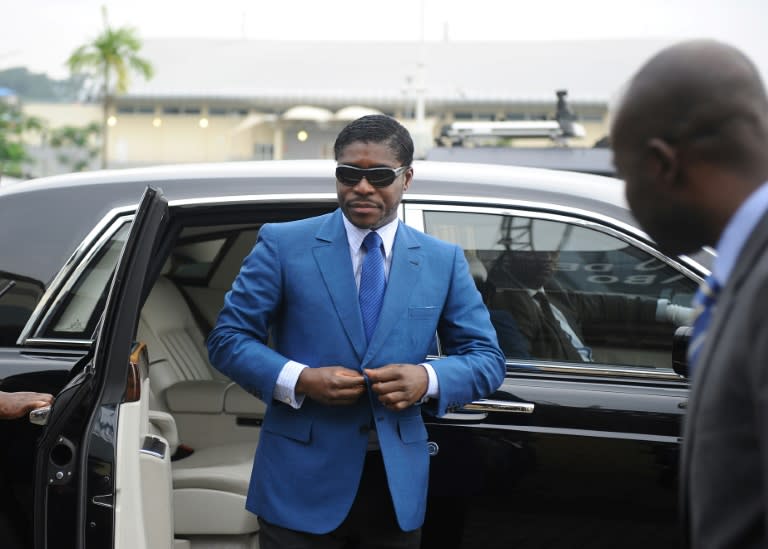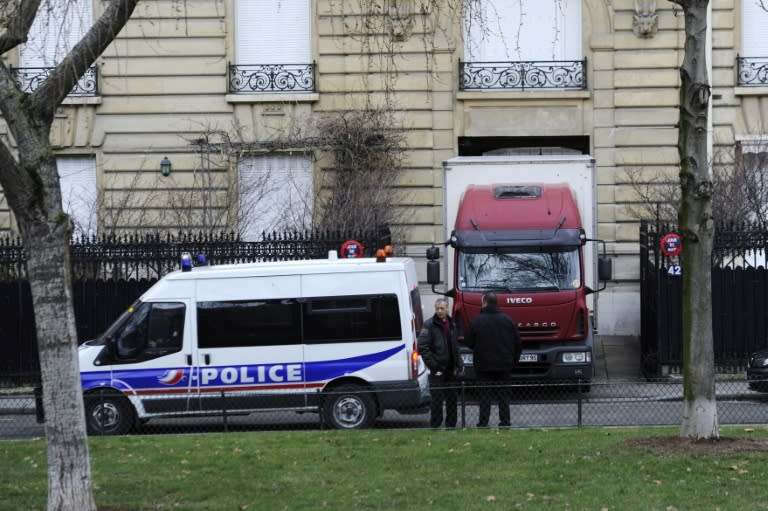E.Guinea leader's son gets suspended jail term in Paris graft trial
A French court handed down a three-year suspended jail term on Friday to the son of Equatorial Guinea's leader, Teodorin Obiang, after convicting him of using public money to fund a jet-set lifestyle in Paris. The 48-year-old vice president of the west African state, who was tried in absentia, was also given a suspended fine of 30 million euros (35 million dollars) by judges for embezzlement, money laundering, corruption and abuse of trust. The case, which was spearheaded by two anti-corruption NGOs, is the first of three involving families of African leaders accused of using ill-gotten gains to live it up in France. "Every year billions of euros are embezzled to fund the profligate lifestyle of a few corrupt leaders abroad, particularly in France," Transparency International, one of the two NGOs said ahead of the ruling, adding that it aimed "to ensure that France is no longer a place to launder money". Obiang's lawyers slammed the ruling as an "activist decision" and said they were considering an appeal. The families of late Gabonese leader Omar Bongo and the Republic of Congo's President Denis Sassou Nguesso are also under investigation for embezzlement. Obiang is the son of Equatorial Guinea's president of 38 years, Teodoro Obiang Nguema. He was accused of spending more than 1,000 times his official annual salary on a six-storey mansion in a posh part of the French capital, a fleet of fast cars and artworks, among other assets. Prosecutors argued he could not have funded the purchases without raiding state coffers. They had called for him to be given a three-year jail term and a 30-million-euro ($35 million) fine. The Paris court handed down the sentences but suspended them, meaning that Obiang would only face jail time or have to pay the money if he is found to have re-offended in France. The court also ruled that his 107-million-euro ($123-million) residence near the Champs-Elysees avenue -- which boasts a hammam, a disco and gold-plated taps -- be confiscated, along with other assets. Obiang did not attend his three-week trial in June and July, dismissing it as a "farce". His lawyers accused France of "meddling in the affairs of a sovereign state". The court ruled that while Obiang could not be tried in France for his actions in his homeland he could be prosecuted for laundering money for his personal use. - Fast cars and snazzy suits - Obiang was agriculture and forestry minister before being promoted by his father to vice president in 2012, putting him in pole position to succeed him as leader when the post becomes vacant. Many of his eye-popping French purchases were made through Somagui Forestal, a forestry company that prosecutors called "an empty shell used solely to channel public money". The investigation revealed a lifestyle in stark contrast with that of ordinary people in Equatorial Guinea, where over the half the population lives on less than $1.90 a day despite the country being one of Africa's top oil producers. Obiang's tastes included suits from Paris's top tailors, whom he paid with suitcases of cash. He insisted the money came from legitimate sources. The trial included striking testimony from former British mercenary Simon Mann, who led a failed 2004 coup in Equatorial Guinea. Testifying on behalf of the government he tried to overthrow, Mann alleged that the case was the work of billionaire US philanthropist George Soros, whom he accused of plotting to overthrow Obiang's father. The affair first made headlines in 2011 when investigators raided the Paris residence, hiring trucks to haul away a fleet of Bugattis, Ferraris, a Rolls-Royce Phantom and other cars. Investigators seized the property a year later. Equatorial Guinea argues that it is a diplomatic mission and therefore untouchable. Obiang's lawyers have referred the issue to the International Court of Justice in The Hague. In an interim ruling in December 2016, the UN court ordered France to give the property the same protections as all other diplomatic locations. It cannot be confiscated and auctioned off by French authorities until the court in The Hague has decided the matter. Transparency International has demanded that any money recovered from the sale of Obiang's assets be returned to Equatorial Guinea instead of going into French state coffers. burs-cb/adp/pg



